Martin Heidegger
Martin Heidegger (1889–1976) was a German philosopher and one of the most influential thinkers of the 20th century, best known for his work Being and Time (Sein und Zeit, 1927), which established a new dimension of ontology – the analysis of being through the existential dimension of man (Dasein). He was born in Messkirch and studied theology and philosophy. He was a professor at the University of Freiburg, where he took over the chair from his mentor Edmund Husserl, the founder of phenomenology.
In Being and Time, Heidegger introduces an existential analysis of human existence, emphasizing the concept of “being towards death” and authenticity. The question of the meaning of being becomes central to his philosophy. Later, he turns to the so-called “late Heidegger”, where he is more concerned with language, poetry and the relationship of man to technology and the essence of being. Works such as What Does It Mean to Think?, Introduction to Metaphysics and The Question of Technology reflect this phase.
Heidegger's philosophy was extremely influential, but his membership in the Nazi Party (NSDAP) in 1933 sparked controversy and ethical debates surrounding his intellectual contributions.
Despite this, he remains a key figure in existentialism, hermeneutics, and contemporary philosophy. His ideas have had a strong influence on thinkers such as Sartre, Derrida, and Gadamer.

